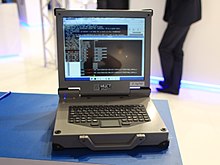The Information technology sector in Russia employed around 300,000 people in 2012, and contributed 1.2% of the country's GDP in 2015. The sector is concentrated in the cities of Moscow and Saint Petersburg.
History
See also: History of computing in the Soviet UnionThe Russian IT sector drew comparatively little from Soviet-era institutions. Russian IT companies were started in the early 1990s by founders with an academic background seeking to find a place in the new market economy. Piracy was widespread in the country, with an estimated 90% of all software in Russia being pirated in 1997.
In the 1990s, companies such as Vist began assembling computers out of foreign-made components, targeting small businesses and families who could not afford foreign brands like IBM and Compaq. DVM Computer gained some traction in the laptop market with its RoverBook brand. The Russian Computer Association (Российская компьютерная ассоциация) was the trade association representing the sector. In 1997 Yandex was established in Moscow.
In 1999 MCST developed the Elbrus 2000 processor, which was initially hyped as an Itanium killer, but the project was hampered by a chronic lack of funding.
Over time, Russian companies moved to software development, an activity which enjoyed higher margins. Local companies cater to the specific needs of the Russian market, such as ERP software developed by 1C Company with a focus on Russian accounting rules. Kaspersky Labs is described as the flagship company of the Russian IT industry. Exports of software and IT services from Russia reached $7 billion in 2015, up from $2.8 billion in 2009.

In 2012 MCST launched the NT-ElbrusS, a rugged laptop for military applications.
In the aftermath of the War in Donbass and the annexation of Crimea, the Ukrainian government banned a number of Russian IT companies from conducting business in the country.
In June 2015 the Russian parliament passed a law to establish a preference system for software developed in Russia.
Worsening relations between the United States and Russia have led some to advocate a purge of Russian software.
Largest Internet companies
List of the largest internet companies based in Russia, according to the local version of Forbes:
| Rank | Name | Established | Headquarters |
|---|---|---|---|
| 1 | Yandex | 2000 | Moscow |
| 2 | VK | 1998 | Moscow |
| 3 | Avito | 2007 | Moscow |
| 4 | Wildberries | 2004 | Moscow |
| 5 | Lamoda | 2011 | Moscow |
| 6 | Ozon Group | 2000 | Moscow |
| 7 | HeadHunter | 2000 | Moscow |
| 8 | Citylink | 2008 | Moscow |
| 9 | 2GIS | 1999 | Novosibirsk |
| 10 | KupiVIP Group | 2008 | Moscow |
See also
References
- ^ Pulya, Vsevolod (1 February 2012). "Russian IT market faces cloudy future". Archived from the original on 25 July 2017. Retrieved 16 November 2017.
- "IT Outsourcing & Software Development in Russia" (PDF). Schneider Group. September 2016. Archived (PDF) from the original on 2017-03-03.
- ^ "The Growth of Russia's IT Outsourcing Industry: The Beginning of Russian Economic Diversification?". Wilson Center. 7 July 2011. Archived from the original on 5 July 2017. Retrieved 16 November 2017.
- "Gates Urges Russia to Stop Software Piracy". partners.nytimes.com. 10 November 1997. Archived from the original on 5 December 2013. Retrieved 16 November 2017.
- "Russian Computers Break Out of the Red". The Moscow Times. Archived from the original on 17 November 2017. Retrieved 16 November 2017.
- ""Белый Ветер" продолжает продвигать "красные" компьютеры". Computerworld Россия (in Russian). 13 April 1995. Archived from the original on 17 November 2017. Retrieved 17 November 2017.
- "Ассоциации компьютерных фирм в России". Kommersant. 22 December 1995. Archived from the original on 17 November 2017. Retrieved 17 November 2017.
- "Yandex, Russia's biggest technology company, celebrates 20 years". The Economist. 30 September 2017. Archived from the original on 2 October 2017. Retrieved 17 November 2017.
- "Top Microsoft boffin votes for Russian Merced Killer". 16 June 1999. Archived from the original on 3 October 2012. Retrieved 16 November 2017.
- "Russian "Itanium Killer" Isn't Dead Yet - ExtremeTech". ExtremeTech. 23 May 2002. Archived from the original on 26 June 2017. Retrieved 16 November 2017.
- "A Russian Software Billionaire Takes on SAP and Oracle". Bloomberg.com. 15 June 2017. Archived from the original on 31 October 2017.
- "Information technology could become a Russian window to the Asia-Pacific". Russia Direct. Archived from the original on 2 July 2017. Retrieved 16 November 2017.
- RBTH, special to (12 January 2016). "Russian software is conquering the world". Archived from the original on 24 July 2017. Retrieved 16 November 2017.
- "This 22-pound "Made in Russia" laptop is actually pretty useful". Quartz. Archived from the original on 13 November 2017. Retrieved 17 November 2017.
- "KYIV BLOG: Ukraine goes overboard with Russian internet bans". Intellinews. Archived from the original on 12 June 2017. Retrieved 16 November 2017.
- "Restrictions on Foreign Software for State Procurements" (PDF). EY.com. Archived (PDF) from the original on 17 November 2017. Retrieved 17 November 2017.
- Perlow, Jason (9 October 2017). "Beyond Kaspersky: How a digital Cold War with Russia threatens the IT industry". ZDNet. Archived from the original on 31 January 2017. Retrieved 17 November 2017.
- "20 самых дорогих компаний Рунета — 2018". Forbes.ru. Retrieved 19 October 2018.
External links
- Federal registry of Russian software Archived 2016-11-06 at the Wayback Machine
| Economy of Russia | |
|---|---|
| History |
|
| Natural resources | |
| Industry | |
| Infrastructure | |
| Services | |
| Finance |
|
| Regional economies | |
| Economic regions | |
| Other | |